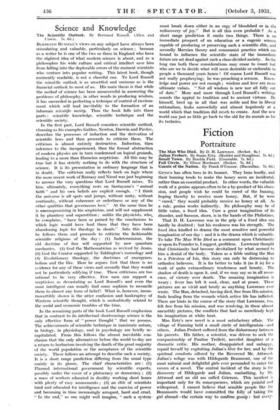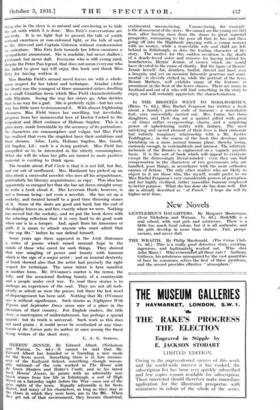Fiction
Portraiture
The Man Who Died. By D. H. Lawrence. (Seeker. 6s.) Small Town. By Bradda Field. (Constable. 7s. 6d.) Full Circle. By Elinor Mordaunt. (Seeker. 7s. 6d.) Guests of the Nation. By Frank O'Connor. (Macmillan. 7s. 6d.)
GENIUS has often bees in its bonnet. They buzz loudly, and their buzzing tends to make the honey seem an incidental,
rather than an essential product. In other words, the valuable work of a genius appears often to be a by-product of his Obses- sion, and People wish he could be cured of the buzzing, hoping thereby to receive more honey. But, if he were " cured," they would probably receive no honey at all. As a rule, genius works indirectly. Its philosophy may be of little value, a fixed idea. Cure a great imagination of its disorder, and Samson, shorn, is in the hands of the Philistines.
That D. H. Lawrence was in the grip of a fixed idea can haidly be doubted ; but his weakness was his strength: The fixed idea kindled to drama the most sensitive and powerful imagination of our day : and it is the drama which is valuable. To take The Man Who Died as a comment upon Christianity
or upon its Founder is, I suggest, profitless. Lawrence thought that Christianity had become devitalized by what seemed to him a denial of the body. Taken as a fable uniting the Man to a Priestess of Isis, this story can only be distressing to orthodox believers. It is far better to take it (as it is) for a work of quite extraordinary tenderness and beauty. The shadow of death is upon it, and, if we may say so in all rever- ence, of victory over death. The amazing imagination is weary ; fever has left it cool, clear, and at peace. These pictures are as vivid and lovely as anything Lawrence ever wrote. The Man, detached, having died, free from His mission, finds healing from the wounds which active life has inflicted. There are hints in the course of the story that Lawrence, too, felt free from his mission, and was resolving, in these almost unearthly pictures, the conflicts that had so mercilessly kept his imagination at white heat.
Miss Ertz's new novel is a most satisfactory affair. The village of Fanning held a small circle of intelligentsia—and others. Julian Probert suffered from the disharmony between his parents. His father, a scientist, was driven to seek the companionship of Pauline Trellett, novelist daughter of a dramatic critic. His mother, disappointed and unhappy, repaid herself by exploiting Julian's lOve for her, and by the spiritual comforts offered by the Reverend Mr. Attwood. Julian's refuge was with Hildegarde Beaumont, one of the most natural and delightful girls ever persuaded to enter the covers of a novel. The central incident of the story is the discovery of Hildegarde and Julian, sunbathing, by Mr. Attwood and an old ass called Grierson. This incident is important only for its consequences, which are painful and widespread. I cannot believe that sensible people like the Beaumonts would have committed the folly of taking the girl abroad—the certain way to confirm gossip : but every-
thing else in the story is so natural and convincing as to hide the art with which it is done. Miss Ertz's conversations are
masterly. It is no light feat to present the talk of youth without sweetness or rose-coloured light, or the talk of such as Mr. Attwood and Captain Grierson without condescension or caricature. Miss Ertz feels towards her fellow-creatures a sympathetic amusement. She is readable, but never shallow; profound, but never dull. Everyone who is still young (and, despite the Peter Pan legend, that does not mean everyone who has failed to grow up) will enjoy this book and thank Miss Ertz for haVing written it.
Miss Bradda Field's second novel leaves me with a whole-
some respect for her talent and technique. Ariadne (Adne for short) was the youngest of three unmarried sisters dwelling in a small Canadian town which Miss Field characteristically calls Elysium. Seeing the way her sisters go, Adne decides that is no way for a gull. She is perfectly right—but her own way has little mote to recommend it. With almost frightening clearness, Miss Field traces her unwilling, but inevitable, progress from her unsuccessful love of Doctor Corbeil to the corpulent and illicit embrace of Holman Sugden. This is a grim story, made formidable by the accuracy of its portraiture. Its characters are commonplace and vulgar, but MSS Field has realized that even the stupidest have their ambitions and their dreams. Adne, Lotis, Holman Sugden, Mrs. Gaudi, Ed Sugden, Lil : each is a living portrait. Miss Field has compelled us to be interested in the utterly commonplace. What She will do when her gifts are turned to more positive material is exciting to think upon.
The trouble about Full Circle is that it is not full, but flat, and cut out of cardboard. Mrs. Mordaunt has picked up an idea about a successful novelist who uses all his acquaintance, particularly his literary acquaintance, as copy. This idea has apparently, so enraged her that she has sat down straight away to write a book about it. Her Leverson Hurle, however, is not a human being—not even a novelist. She has set up a cockshy, and treated herself to a good time throwing stones at it. Some of the shots are good and hard, but the end of the display leaves us, and her, exactly where we were. Nothing has moved but the cockshy, and we put the book down with the sobering reflection that it is very hard to do good work when one is in a temper. And, apart from his innocence or guilt, it is mean to attack anyone .who must admit that " the cap fits " before he can defend himself.
Some years ago there appeared in the Irish Statesman a series of poems which raised unusual hope in the minds of those who eared for such things. They showed that rare mingling of power and beauty with humour which is the sign of a major" artist : and an ironical dexterity of finish showed also that the artist had precisely the right respect for technique. The same talent is here manifest in another form. Mr. O'Connor's matter is the terror, the folly, and the occasional flashing beauty of a countryside and a people under civil war. To read these stories is to undergo an experience of the soul. They are not all tech- nically as adroit as were the poems, but there the last word of disparagement has 'been said. Nothing that Mr. O'Connor sees is without significance. Such stories as Nightpiece With Figures and September Dawn seem sure of a place in the literature of their country. For English readers, the title story, a masterpiece of understatement, has perhaps a special appeal : but its truth is universal. Such work as this does not need praise : it could never be overlooked at any time. Guests of the Nation puts its author at once among the finest living writers of the short story.
L. A. G. STRONG.











































 Previous page
Previous page